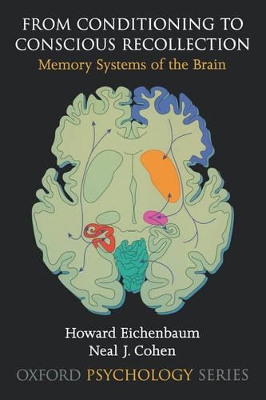Oxford Psychology
1 primary work
Book 35
From Conditioning to Conscious Recollection
by Howard Eichenbaum and Neal J. Cohen
Published 26 April 2001
This cutting-edge book offers a theoretical account of the evolution of multiple memory systems of the brain. The authors conceptualize these memory systems from both behavioural and neurobiological perspectives, guided by three related principles. First, that our understanding of a wide range of memory phenomena can be advanced by breaking down memory into multiple forms with different operating characteristics. Second, that different forms of memory representation are supported by distinct brain pathways with circuitry and neural coding properties. Third, that the contributions of different brain systems can be compared and contrasted by distinguishing between dedicated (or specific) and elaborate (or general) memory systems. A primary goal of this work is to relate the neurobiological properties of dedicated and elaborate systems to their neuropsychological counterparts, and in so doing, account for the phenomenology of memory, from conditioning to conscious recollection.
